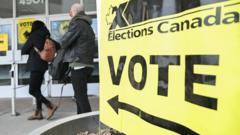In a campaign that has captivated many, Canadians are preparing to vote amid the din of U.S. politics. The once-strong Conservative party, led by Pierre Poilievre, was favored to win early this year, but external pressures have changed the narrative. Recent polls indicate that Mark Carney's Liberal Party is maintaining a slight lead, thanks in part to the presidential actions across the border.
In a tragic turn, the campaign concluded with a somber backdrop following a car ramming incident in Vancouver that claimed 11 lives. Both Carney and Poilievre are navigating the aftermath, adapting their messages to reflect community concerns and national sentiments. Carney emphasizes strong international ties, pivoting from what he describes as an outdated relationship with the U.S., while Poilievre focuses on the current economic struggles of Canadians, positioning himself as the change the country needs.
With the election set to unfold across multiple time zones and record early voting turnout, it’s shaping up to be a contest not just for leadership, but a referendum on how Canada defines itself in a world increasingly influenced by Trump. As voters prepare to cast their ballots, the stakes are exceptionally high, merging local concerns with global affairs in an unprecedented way.
In a tragic turn, the campaign concluded with a somber backdrop following a car ramming incident in Vancouver that claimed 11 lives. Both Carney and Poilievre are navigating the aftermath, adapting their messages to reflect community concerns and national sentiments. Carney emphasizes strong international ties, pivoting from what he describes as an outdated relationship with the U.S., while Poilievre focuses on the current economic struggles of Canadians, positioning himself as the change the country needs.
With the election set to unfold across multiple time zones and record early voting turnout, it’s shaping up to be a contest not just for leadership, but a referendum on how Canada defines itself in a world increasingly influenced by Trump. As voters prepare to cast their ballots, the stakes are exceptionally high, merging local concerns with global affairs in an unprecedented way.




















